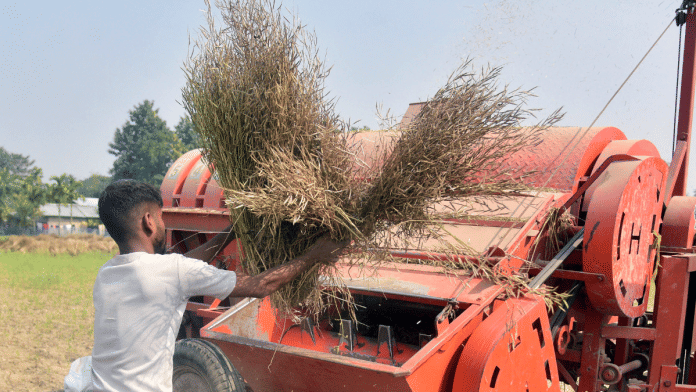New Delhi: Emphasising ‘agriculture as the first engine’ for the development of India, Finance Minister Niramala Sitharaman Finance announced the launch of the ‘PM Dhan Dhanya Krishi Yojana covering 100 districts with low productivity.
Another major step taken in the Union Budget 2025 for the farming community was enhancing the limit for interest subvention scheme for Kisan Credit Cards from Rs 3 lakh to Rs 5 lakh. “Kisan Credit Cards (KCC) facilitate short term loans for 7.7 crore farmers, fishermen, and dairy farmers,” Sitharaman said in her speech Saturday.
The KCC scheme was introduced in 1998 for issuing Kisan Credit Cards to farmers on the basis of their holdings for uniform adoption by the banks so that farmers may use them to readily purchase agriculture inputs such as seeds, fertilizers, pesticides etc. and draw cash for their production needs.
To become self-reliant in the production of pulses, Sitharaman said that the government would launch a six-year mission with a special focus on Tur, Urad, and Masoor. Central agencies (NAFED and NCCF) will be ready to procure these 3 pulses, as much as offered during the next 4 years from farmers who register with these agencies and enter into agreements, she added.
“Ten years ago, we made concerted efforts and succeeded in achieving near self-sufficiency in pulses. Farmers responded to the need by increasing the cultivated area by 50 per cent and the government arranged for procurement and remunerative prices. Since then, with rising incomes and better affordability, our consumption of pulses has increased significantly,” Sitharaman said.
The focus on increasing yield of pulses is the need of the hour. India has been forced to import pulses for domestic consumption. India imported 45 lakh tonnes of pulses in 2023-2024 as opposed to 26 lakh tonnes in 2022-2023. Last year, import of pulses almost doubled in 2023-2024 to $ 3.74 billion. The government had explored new markets in Brazil and Argentina to meet the need in domestic markets.
Though India is the largest producer of pulses in the world, its production has fallen short of the huge demand. India produced 27.3 million tonnes of pulses in FY22, which further fell to 26 million tonnes in FY23, and 24.5 million tonnes in FY24, according to the agriculture ministry data.
Also Read: Modi 3.0 gives giant relief to middle class—no tax on income up to Rs 12 lakh
Putting money in farmers hands & more
The Prime Minister Dhan-Dhaanya Krishi Yojana will help 1.7 crore farmers produce more and find space to store harvest, as well as access better irrigation facilities.
“Through the convergence of existing schemes and specialized measures, the programme will cover 100 districts with low productivity, moderate crop intensity and below-average credit parameters. It aims to enhance agricultural productivity, adopt crop diversification and sustainable agriculture practices, augment post-harvest storage at the panchayat and block level, improve irrigation facilities, and facilitate availability of long-term and short-term credit,” Sitharaman said.
Noting that the government wants to empower rural youth and create employment opportunities in rural areas, Sitharaman declared that the government wants to create ample opportunities in India’s villages so that migration becomes an option, not a necessity.
To that end, she announced the ‘Rural Prosperity and Resilience’ programme, in partnership with states, focusing on rural women, landless families, small and marginal farmers as well as rural youth. “This will address under-employment in agriculture through skilling, investment, technology, and invigorating the rural economy,” Sitharaman added.
The building of 100 agricultural districts will form the phase one of the programme. “Global and domestic best practices will be incorporated and appropriate technical and financial assistance will be sought from multilateral development banks,” the finance minister added.
The government has announced the opening of a new urea plant in Namrup, Assam with an annual capacity of 12.7 lakh metric tons.
The government also put special focus on fruits and vegetables, claiming that the consumption of both has been rising as the population becomes more aware of the nutritional value of food. “A comprehensive programme to promote production, efficient supplies, processing, and remunerative prices for farmers will be launched in partnership with states. Appropriate institutional mechanisms for implementation and participation of farmer producer organizations and cooperatives will be set up,” Sitharaman announced.
India is the second largest producer of fruits and vegetables after China. But, demand for more exotic fruits and vegetables, especially by the middle classes, make India’s import fruit market substantially big at Rs 14,300 crore.
Sitharaman also announced a National Mission on High Yielding Seeds which will aim to strengthen the research ecosystem on high yielding seeds, focus on targeted development and propagation of seeds with high yield, pest resistance and climate resilience. The government, she said, has already made available more than 100 varieties of seeds since July 2024.
The government also seeks to bolster India’s huge aquaculture and fish production industry. “To unlock the untapped potential of the marine sector, our Government will bring in an enabling framework for sustainable harnessing of fisheries from the Indian Exclusive Economic Zone and High Seas, with a special focus on the Andaman & Nicobar and Lakshadweep Islands,” Sitharaman said.
Yet another mission was announced which will focus on cotton production over five years, focusing on sustainability and productivity of cotton farming. “Aligned with our integrated 5F vision for the textile sector, this will help in increasing incomes of the farmers, and ensure a steady supply of quality cotton for rejuvenating India’s traditional textile sector,” Sitharaman said.
A makhana board will be additionally set up in Bihar, this budget’s favourite state. The board will focus on improving production, procession, value addition and marketing of makhana. It seeks to “handhold” farmer producer organisations to ensure benefits of relevant government schemes reach the farmer, the finance minister said.
(Edited by Tony Rai)
Also Read: 10,000 new medical seats, 28% more for Ayushman Bharat, but not much hike in overall health budget






